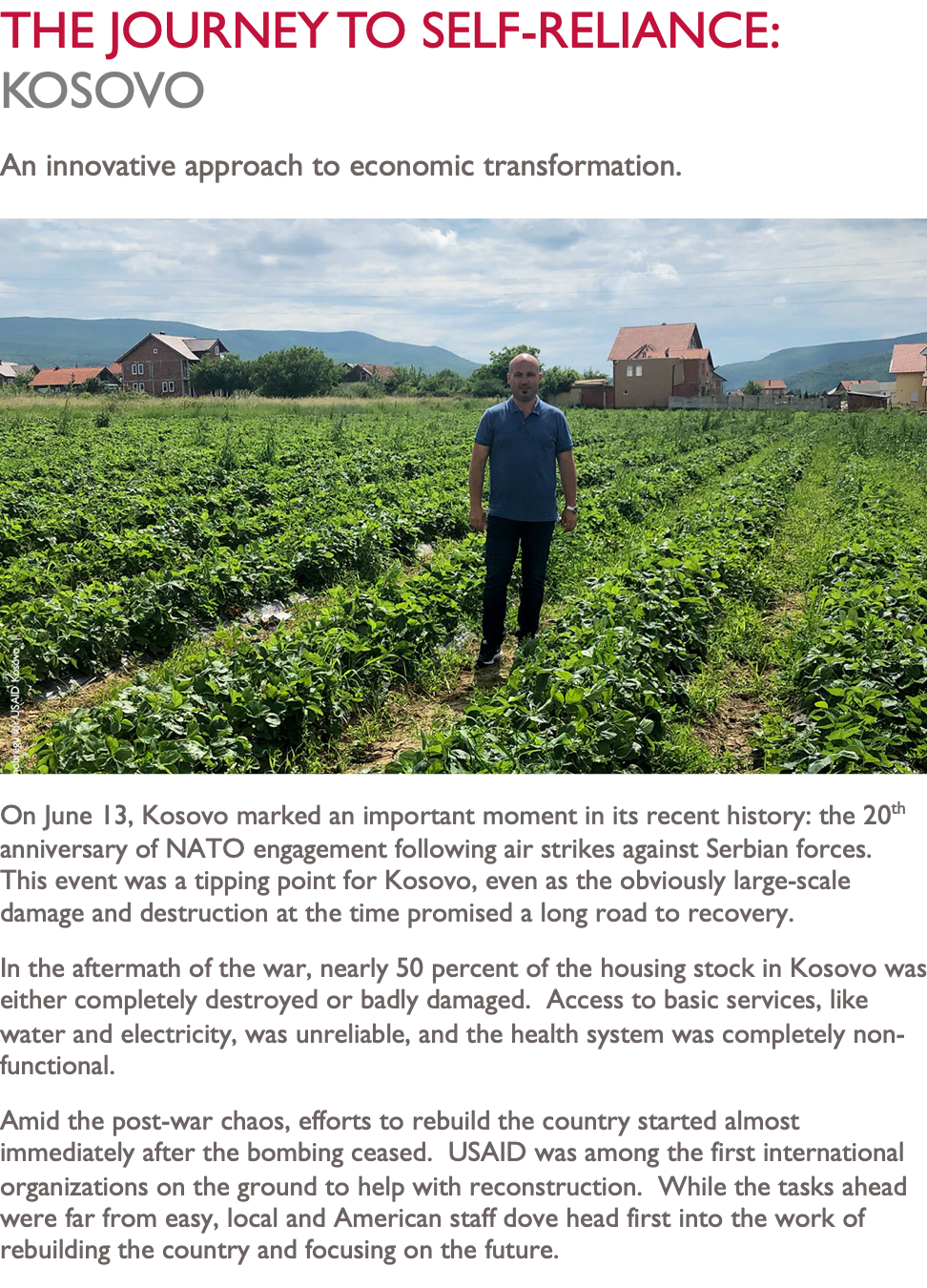Speeches Shim
On June 13, Kosovo marked an important moment in its recent history: the 20th anniversary of NATO engagement following air strikes against Serbian forces. This event was a tipping point for Kosovo, even as the obviously large-scale damage and destruction at the time promised a long road to recovery.
In the aftermath of the war, nearly 50 percent of the housing stock in Kosovo was either completely destroyed or badly damaged. Access to basic services, like water and electricity, was unreliable, and the health system was completely non-functional.
Amid the post-war chaos, efforts to rebuild the country started almost immediately after the bombing ceased. USAID was among the first international organizations on the ground to help with reconstruction. While the tasks ahead were far from easy, local and American staff dove head first into the work of rebuilding the country and focusing on the future.
Twenty years later, with few outward signs of the past destruction, Kosovo has started anew. As the youngest country in Europe, Kosovo has made remarkable progress on its journey to self-reliance, including organizing independent, democratic elections; establishing functioning, stable institutions; fostering fiscal stability and a sound financial system; and developing a vibrant civil society and media sector.
These achievements are largely the result of partnerships with international organizations and innovative approaches to problem-solving. The Kosovo Credit Guarantee Fund (KCGF) is one such example. Established by USAID and Kosovo’s Ministry of Trade and Industry in 2016, the Fund soon leveraged additional funding from Swiss, Swedish and German governments and most recently from the EU.
While Kosovo’s banking sector boomed over the last two decades, access to finance for many businesses remained scarce, as financial institutions considered loans to small- and medium-sized businesses too risky. KCGF was created to fill this void and broaden access by issuing loan guarantees to private financial institutions. Modeled after USAID’s Development Credit Authority, the KCGF guarantees served as a collateral substitute, allowing banks to reduce their collateral requirements and more confidently lend to small- and medium-sized businesses.
By tailoring financial products to the explicit needs of the private sector, KCGF has become a sustainable, locally-led success in Kosovo. As of May 2019, KCGF has partially guaranteed nearly 3,000 loans, worth over €125 million, for small- and medium-sized enterprises. More than 25 percent of loans guaranteed by KCGF have gone to businesses in key growth sectors, creating transformative impact in the manufacturing and agriculture sectors. This new stream of capital in the private sector has helped create over 3,000 new jobs, boosted domestic production, and enabled businesses to start exporting their products, while building up the made-in-Kosovo brand abroad.
With this success, European markets have started to take notice of what Kosovo has to offer. Newly introduced, high-yield crops, coupled with modern farming techniques and evolving outlooks are radically changing how and what Kosovo’s farmers grow. Encouragingly, increasing numbers of smart, motivated young people are taking a second look at agriculture and pursuing careers in this burgeoning sector.
Companies in the wood-processing and ICT sectors are also experiencing major success as a result of greater access to finance. Made-in-Kosovo doors, windows, furniture, and kitchens are taking EU markets by storm, with €28 million of wood products exported from Kosovo just in 2018. Drawing on Kosovo’s strength in information technology and foreign languages, the ICT services sector is also experiencing robust demand from abroad.
These successes would not have been possible without addressing one of the biggest impediments to economic growth in Kosovo: poor access to finance. Through KCGF, many businesses have been able to upgrade their technology and equipment, improve product quality, and invest in innovation and workforce development.
“Access to an affordable loan is key to my work. I started as a fruits and vegetables producer and slowly I expanded to regional markets. But my dream was bigger, and a recent loan is helping me achieve my dream,” says Sali Statovci, owner of EcoFruti, a fruits and vegetables processor in Podujeve. A loan from one of the local banks allowed him to purchase new technology for production of fruit yoghurt. This is the first of its kind in Kosovo, and as Statovci reports, even in the region. Statovci’s story is one of 3,000 borrowers through the Kosovo Credit Guarantee Fund.
Today, the success of KCGF, which is now an independent, self-sustaining institution, underscores how USAID assistance can facilitate sustainable economic development. By leveraging funds, partner commitment, and donor collaboration, USAID has helped KCGF—and Kosovo— to rebuild and transform.


Comment
Make a general inquiry or suggest an improvement.